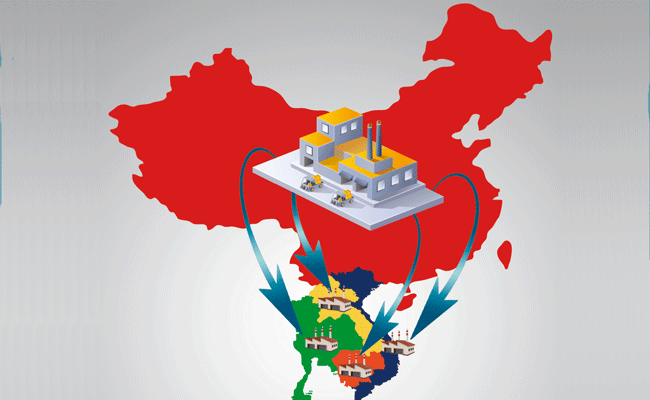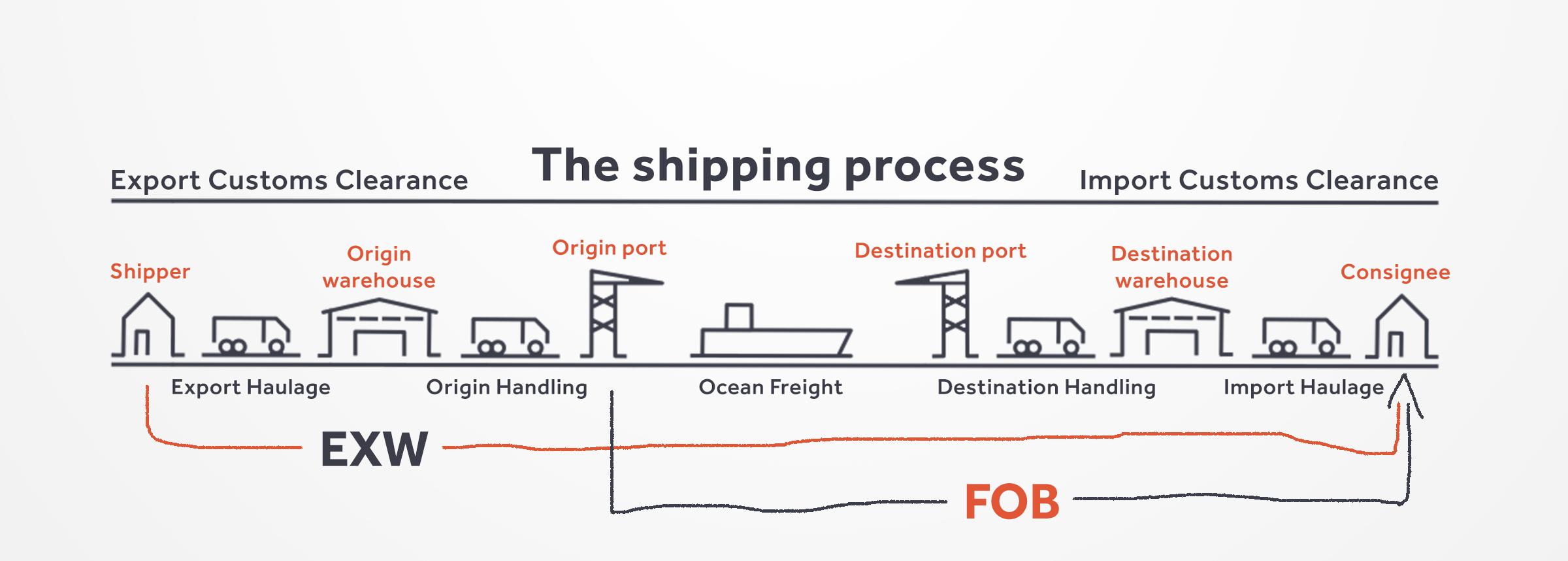
FOB vs CIF vs EXW: Complete Incoterms Guide + Cost Savings Tips (2025)
Introduction: Why Incoterms Matter for Your Business
International trade is complex. Between shipping vessels, customs clearance, and border regulations, countless moving parts determine whether your goods arrive on time and within budget.
These simple sets of three letters can determine who pays for shipping, who takes responsibility if goods are damaged, and how much your total costs actually are.
They are called Incoterms.
If you're importing plushie from Southeast Asia, exporting boardgame to Europe, or managing a global supply chain, you need to understand Incoterms. Choosing the wrong one can cost you thousands - or worse, leave you responsible for goods you never received.
This guide breaks down the 11 standard Incoterms into plain English, comparing FOB, CIF, EXW, DDP, and others so you can make informed decisions that protect your business.
What Are Incoterms? The Foundation You Need to Know
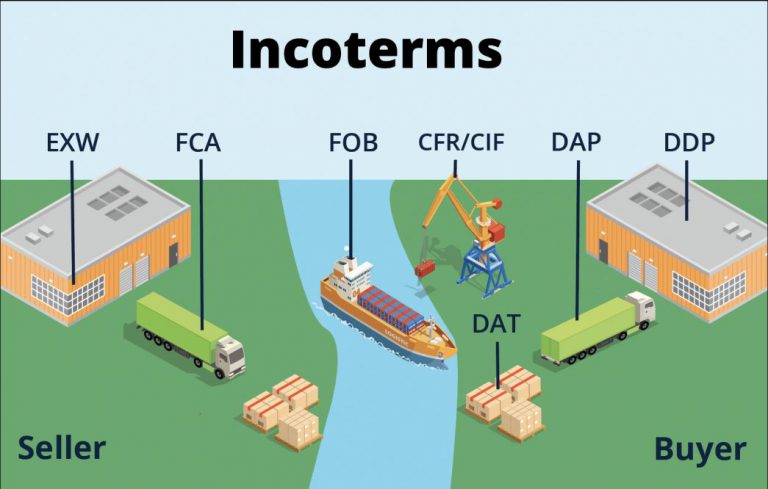
Incoterms (International Commercial Terms) are standardized rules created by the International Chamber of Commerce (ICC) that define the responsibilities of buyers and sellers in international trade transactions.
Think of them as a universal language for global commerce. Whether you're trading with a supplier in Vietnam or selling to a customer in Germany, Incoterms clarify:
- Who pays for shipping?
- When does the buyer take ownership?
- Who handles customs clearance?
- When does risk transfer between parties?
- Who purchases insurance?
The ICC updated Incoterms most recently in 2020, creating the current framework of 11 standardized terms. Each term places different obligations on the buyer and seller - and costs differ dramatically depending on which term you choose.
Key Insight: Using the wrong Incoterm isn't just inefficient. It can create legal disputes, expose you to uninsured losses, and cost you 15-40% more than necessary. If you are expanding your supply chain to a new country in Southeast Asia, it is very risky to make these mistakes with language barriers. It is best to work with a sourcing partner such as Play Trail, who has eyes, ears and hearts on the ground to make sure all preventable issues are taken care of for your brands.
FOB vs CIF vs EXW: Master Incoterms to Save 10-30% on Shipping Costs
The three core Incoterms represent fundamentally different approaches to international trade. Let's compare them side-by-side.
EXW (Ex Works): Maximum Buyer Control, Minimum Seller Responsibility
What it means: The seller makes goods available at their premises (factory, warehouse, or specified location). The buyer assumes all responsibility from that exact moment.
When risk transfers: Immediately upon goods being placed at the buyer's disposal - before even loading onto the collecting vehicle.
Who pays for what:
- Seller: Only the cost of goods produced
- Buyer: Everything else - inland transport, export clearance, ocean freight, insurance, import duties, final delivery
Best for:
- Experienced importers with full logistics capabilities
- Buyers wanting maximum control over shipping routes and carriers
- Price comparison shopping (EXW quotes show the lowest base price)
Common problem: Foreign buyers often lack legal standing to handle exports from the seller's country, making EXW problematic. The ICC actively discourages EXW for international shipments.
EU Warning: Using EXW creates VAT liability risks if buyers fail to properly export goods, leaving sellers exposed.
FOB (Free on Board): The Balanced Middle Ground
What it means: The seller delivers goods once they're loaded onto the vessel at the named port of shipment. "On board" means the exact moment cargo physically rests on the vessel - for containers, this is when cables slacken after placement.
When risk transfers: The moment goods are loaded onto the vessel.
Who pays for what:
- Seller: Inland transport to port, export clearance fees, port terminal charges, and loading costs
- Buyer: Ocean freight, destination port unloading, import clearance, and final delivery
Insurance: Neither party has an obligation - but prudent traders arrange coverage anyway.
Best for:
- Established maritime traders
- Buyers with carrier relationships and shipping expertise
- Transactions where pre-shipment inspection at port of origin is needed
Critical limitation: FOB applies exclusively to sea and inland waterway transport. It cannot be used for air, road, rail, or multimodal shipments.
Cost advantage: Experienced importers typically find FOB 10-25% cheaper than CIF because they control freight selection and avoid seller markups.
CIF (Cost, Insurance and Freight): Convenience at a Premium
What it means: The seller delivers goods on board the vessel at the port of shipment (like FOB) but also contracts and pays for ocean freight and cargo insurance to the named destination port.
When risk transfers: The moment goods are loaded at the port of origin (Shanghai, for example).
When seller's cost responsibility ends: At the destination port (Los Angeles, for example).
Key difference: Risk and cost responsibility split differently. The buyer bears all risk during transit, yet the seller pays the freight charges. This creates the distinctive CIF advantage for new importers - simple, bundled pricing.
Insurance coverage: The seller must provide minimum coverage under Institute Cargo Clauses (C) - the most basic level covering major casualties (total loss, fire, vessel stranding) but not all risks. Coverage must equal at least 110% of contract value and be payable to the buyer.
Best for:
- First-time importers wanting simplified logistics
- Transactions where bundled pricing is preferred
- Buyers without freight forwarder relationships
Cost reality: CIF typically costs 15-30% more than FOB because sellers mark up logistics costs while maintaining control over the shipping arrangement.
Maritime-only limitation: Like FOB, CIF works only for maritime transport and isn't recommended for containerized cargo (where containers sit at terminals for days before vessel loading, creating ambiguous responsibility).
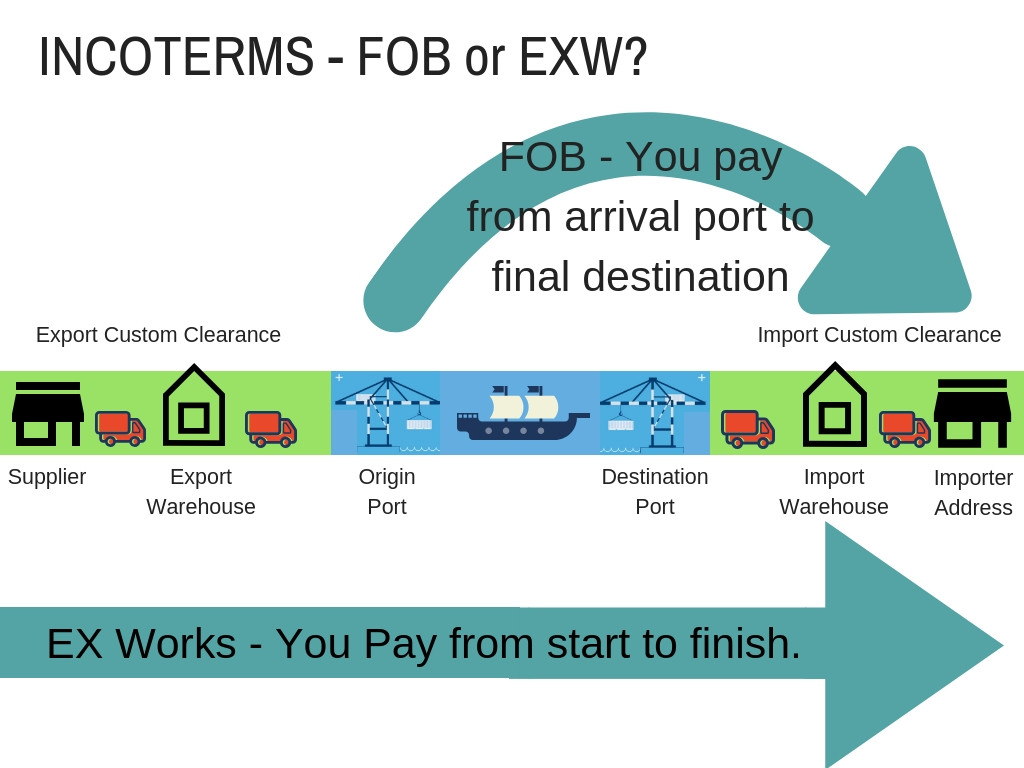
Side-by-Side Comparison: FOB vs CIF vs EXW
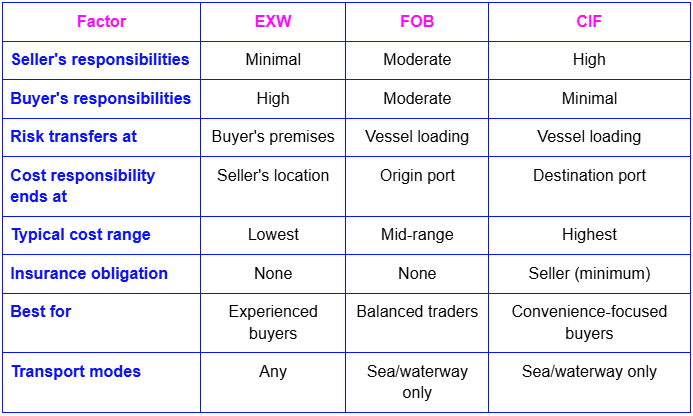
Modern Incoterms: Beyond FOB, CIF, and EXW
As global supply chains became more complex, traders needed Incoterms that worked with air cargo, multimodal shipments, and e-commerce. Here are the modern alternatives reshaping international trade.
CPT (Carriage Paid To): Flexibility for Any Transport Mode
What it is: The seller delivers goods to the first carrier and pays all freight costs to the named destination. Risk transfers immediately upon carrier handover.
Key difference from CIF: CPT works for any transport mode - air, road, rail, sea, or multimodal combinations. No insurance obligation exists.
Real-world example: An Indonesia wooden toy supplier using CPT Chicago would pay all freight to reach Chicago but transfer risk to the buyer the moment goods were handed to the trucking company at the Indonesian factory.
Best for:
- Multimodal shipments involving multiple carriers
- Air freight transactions
- Complex routing requiring flexibility
- Modern supply chains with container and truck combinations
Advantage: CPT pricing typically sits between FOB and CIF because sellers aren't bundling insurance.
DDP (Delivered Duty Paid): Maximum Convenience, Maximum Cost
What it is: The seller delivers goods to the buyer's specified location, having handled everything - transport, import clearance, duties, taxes, unloading. The buyer simply receives ready-to-use goods.
When risk transfers: When goods arrive at the buyer's location, ready for unloading.
Who pays for everything: The seller. All costs and risks are absorbed.
Best for:
- E-commerce businesses
- First-time importers wanting zero logistics involvement
- Situations where buyers want simplicity over cost
- Large retailers forcing complexity onto suppliers
Industry adoption: 28% of wholesale and retail sector businesses now use DDP as their primary term, reflecting big buyers' power to shift logistics burden to suppliers.
Cost reality: DDP typically ranks as the most expensive option. Sellers mark up logistics costs by 20-40% while maintaining control over the entire supply chain.
Challenges:
- Some countries prohibit foreign entities from acting as importers of record
- Sellers may lack knowledge of destination country regulations
- Unexpected import costs can spiral unexpectedly
CIP (Carriage and Insurance Paid To): CPT with Built-in Coverage
What it is: Like CPT, but the seller also purchases cargo insurance covering the buyer's transit risk. Insurance must equal at least 110% of contract value.
Best for:
- Multimodal shipments where insurance coverage is needed
- Air freight with insurance requirements
- Buyers wanting bundled insurance protection
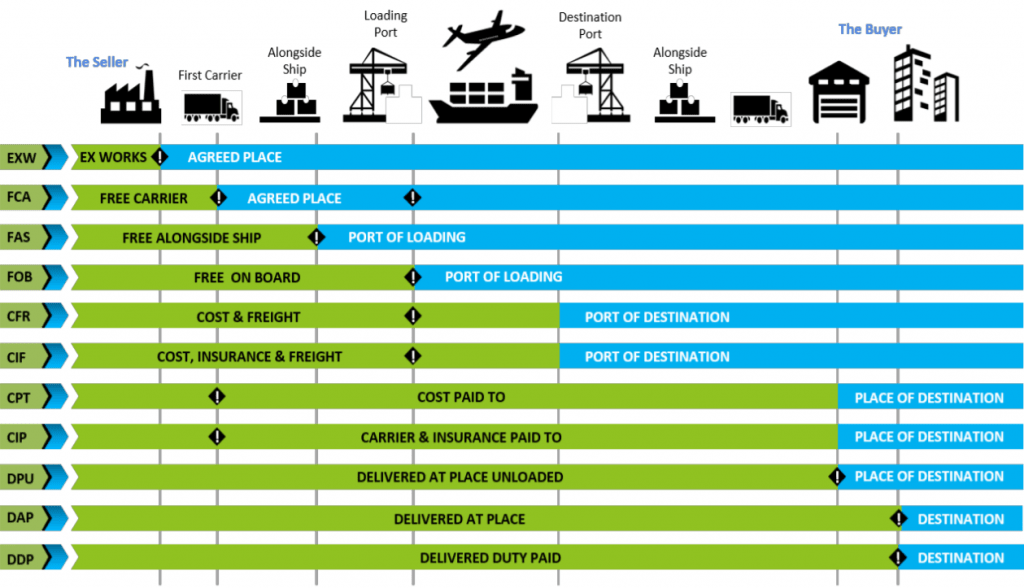
Common Incoterm Mistakes That Cost You Money
Mistake #1: Using FOB for Containerized Cargo (The #1 Error)
The problem: Containers are delivered to terminals days before vessel loading. This creates a responsibility gap during which goods remain at risk but ownership remains unclear.
Why it happens: Letter of Credit conventions and established practices perpetuate FOB usage despite ICC recommendations against it.
The solution: Use FCA (Free Carrier) for containerized shipments instead. FCA provides clarity about when risk transfers to the buyer.
Cost impact: Ambiguous responsibility periods can lead to disputes over loss or damage liability.
Mistake #2: Vague Location Specifications
Wrong: "FOB Shanghai" or "DDP Chicago" Right: "FCA Houston 501 Crawford Street" or "DDP 125 Industrial Way, Phoenix, Arizona"
Why it matters: Vague locations allow sellers to choose any convenient delivery point within broad geographic areas, creating disputes over actual delivery responsibility.
Mistake #3: Confusing Risk vs. Cost in C-Terms
The problem: CIF, CFR, CPT, and CIP have a distinctive split where risk transfers at origin but costs extend to destination.
Common misconception: Buyers assume risk transfers at destination when cost is paid to destination.
The reality: Risk transfers at origin while the seller pays freight forward - buyers bear transit risk even though they haven't paid for the shipping.
Solution: Arrange comprehensive insurance coverage immediately upon risk transfer.
Mistake #4: Misunderstanding What Incoterms Actually Cover
What Incoterms DO govern:
- Transportation responsibilities
- Risk transfer points
- Cost allocation
What Incoterms DON'T govern:
- Payment terms or conditions
- Product quality standards
- Ownership transfer (title)
- Inspection rights
- Broader contract conditions
Common disaster: Assuming an Incoterm defines when title passes or when payment is due.
Solution: Separately document payment timing, quality specifications, inspection rights, and title transfer in your sales contract.
Mistake #5: Insurance Gaps and Minimal Coverage
The problem: Under FOB, CPT, and CFR, no party has an insurance obligation. Under CIF, coverage is minimal (Institute Cargo Clauses C covers only major casualties, not comprehensive protection).
Why it matters: Uninsured losses or underinsured shipments can devastate small businesses.
Solution:
- Explicitly agree who purchases insurance and at what level
- Negotiate higher coverage levels (Clauses A or B) for high-value goods
- Consider supplementary insurance for comprehensive protection
Mistake #6: Surprise Terminal Handling Charges
The problem: Terminal Handling Charges (THC) at destination ports create surprise costs under C-terms (CIF, CFR, CPT, CIP) unless contracts explicitly state responsibility.
Solution: Always specify in writing who bears THC costs at destination.
Complete Incoterms Breakdown: All 11 Terms Explained
Group E: Seller's Premises
- EXW (Ex Works): Goods available at seller's premises; buyer takes all responsibility
Group F: Carriage Unpaid
- FCA (Free Carrier): Seller delivers to named carrier; recommended for containers
- FAS (Free Alongside Ship): Seller delivers alongside vessel at named port
- FOB (Free on Board): Seller delivers on board vessel at named port
Group C: Carriage Paid
- CFR (Cost and Freight): Like CIF but no insurance obligation
- CIF (Cost, Insurance and Freight): Seller pays freight and provides minimum insurance
- CPT (Carriage Paid To): Seller pays carriage to destination; any transport mode
- CIP (Carriage and Insurance Paid To): Like CPT but includes insurance
Group D: Delivery at Destination
- DAP (Delivered at Place): Seller delivers to named place, not unloaded
- DPU (Delivered at Place Unloaded): Seller delivers and unloads at named place
- DDP (Delivered Duty Paid): Seller delivers fully cleared goods at buyer's location
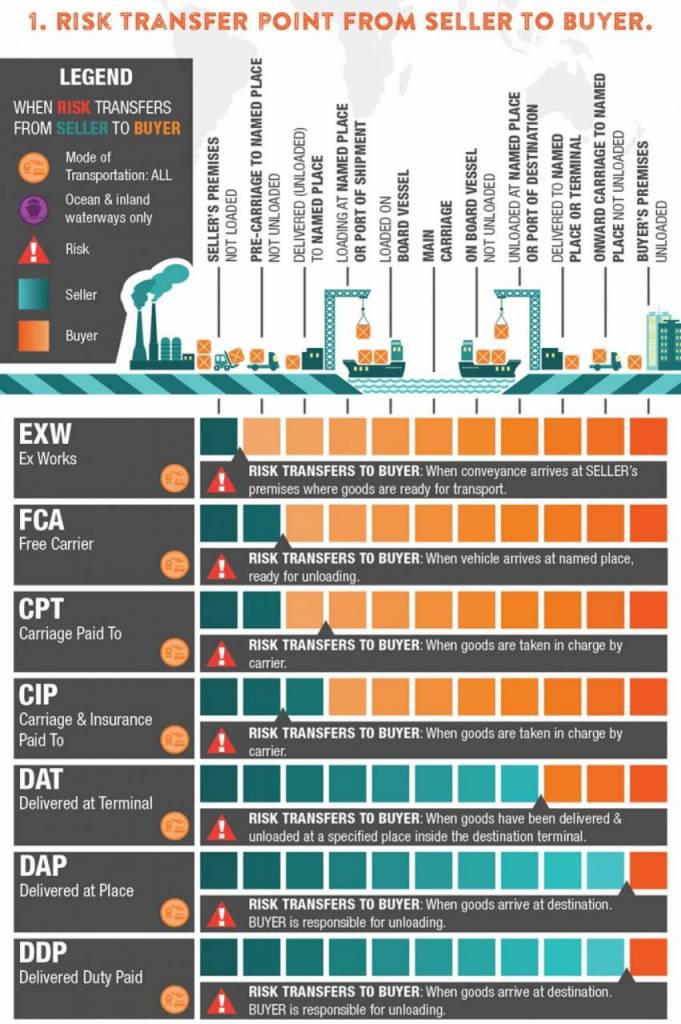
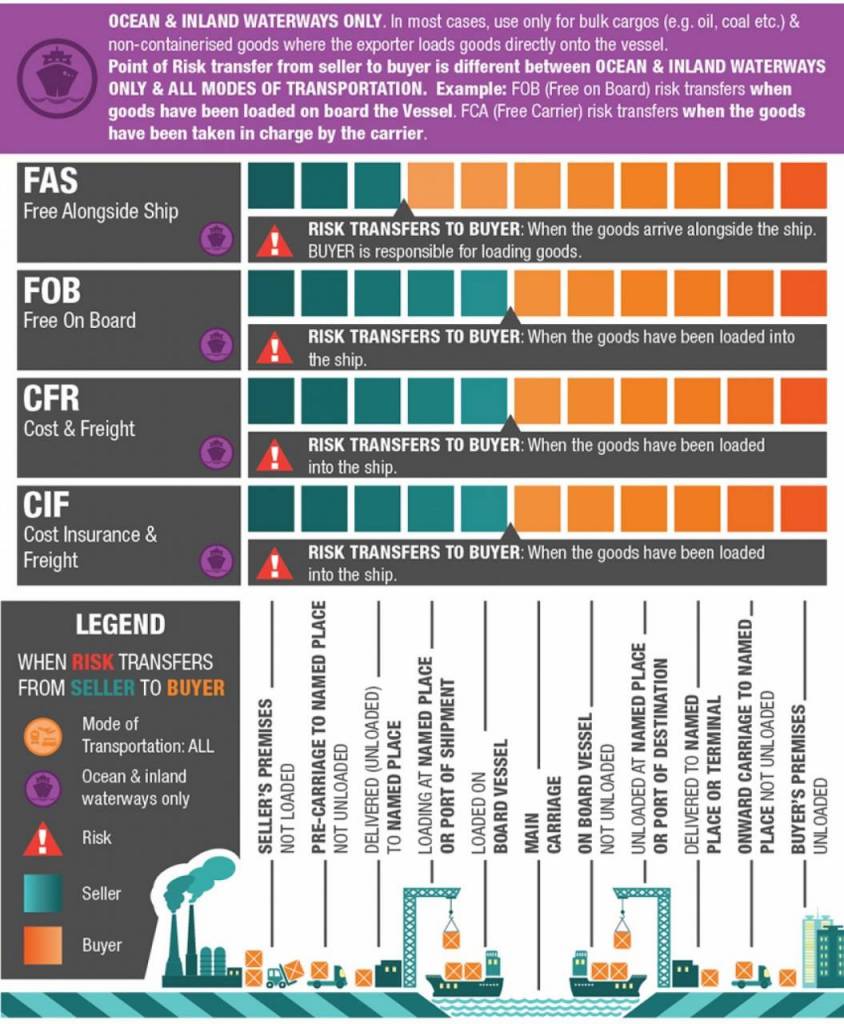
Frequently Asked Questions About Incoterms
Q: Which Incoterm is cheapest?
A: EXW shows the lowest quoted price but requires extensive buyer logistics capabilities. FOB typically offers the best value for experienced traders because you control freight selection while avoiding seller markups. CIF and DDP are most expensive due to seller markups (15-40%).
Q: Can I use FOB for air freight?
A: No. FOB applies exclusively to sea and inland waterway transport. Use CPT or CIP for air freight instead.
Q: What's the difference between FCA and FOB?
A: FCA (Free Carrier) works for any transport mode and is recommended for containerized cargo. FOB only works for maritime transport and assumes break-bulk cargo. FCA transfers risk when goods are handed to the first carrier; FOB transfers risk when goods are on board the vessel.
Q: Does CIF include insurance on all risks?
A: No. CIF requires only minimum insurance under Institute Cargo Clauses (C), which covers major casualties but excludes many risks. For comprehensive protection, negotiate higher coverage levels or purchase supplementary insurance.
Q: What happens if goods are damaged during transit under FOB?
A: The buyer bears the risk after loading onto the vessel. Unless the buyer has purchased cargo insurance, the loss is uninsured. This is why prudent traders arrange coverage even though it's not required.
Q: Can I use EXW internationally?
A: The ICC actively discourages it. Foreign buyers often lack legal standing to export from the seller's country, creating export compliance issues. Use FCA instead.
Q: How much do I typically save by switching from CIF to FOB?
A: Experienced importers report 10-25% cost savings because they control freight selection and avoid seller markups. The exact percentage depends on your freight volume and carrier relationships.
Q: What's the difference between DDP and DAP?
A: DDP (Delivered Duty Paid) requires the seller to handle import clearance and pay all duties and taxes. DAP (Delivered at Place) means the seller delivers to a named place but doesn't handle import clearance - the buyer assumes responsibility for customs and duties. DAP is useful when the seller cannot legally act as importer of record.
Q: Should I always use DDP when buying from large suppliers?
A: Not necessarily. DDP is expensive (sellers mark up 20-40%) and removes your visibility over shipping costs. If you have developing logistics capabilities, negotiate FOB with freight forwarder support to save 10-25% while maintaining simplicity.
The Play Trail Advantage: Expert Supply Chain Solutions for Toy and Product Brands
Understanding Incoterms is essential - but implementation is everything. Many brands master the theory only to struggle with execution: supplier negotiations, logistics coordination, customs complications, and unexpected costs that erode margins.
This is where Play Trail transforms theory into competitive advantage.
Why Play Trail Is Your Ideal Partner
Play Trail has spent over a decade perfecting toy sourcing and supply chain support across Southeast Asia. Working with leading toy and product brands, Play Trail has navigated every challenge this guide discusses: from negotiating optimal Incoterms with suppliers to optimizing landed costs across complex multimodal shipments.
What Brands Achieve Working with Play Trail
Brands partnering with Play Trail typically experience:
- 10-30% reduction in landed costs through optimized Incoterm selection, freight consolidation, and supplier negotiations
- Improved supply chain visibility with real-time tracking and proactive issue resolution
- Faster time-to-market through experienced customs clearance and efficient logistics coordination
- Better product quality via Play Trail's inspection protocols and supplier relationship management
- Reduced operational stress by outsourcing complex supply chain logistics to seasoned experts
- Scalability support as you grow from small shipments to high-volume orders across multiple suppliers
Next Steps: Get Your Free Consultation with Play Trail
You now understand Incoterms. The question is: are you leveraging them to optimize your supply chain?
The gap between Incoterm knowledge and Incoterm mastery costs most brands thousands monthly in unnecessary logistics expenses, operational inefficiencies, and hidden risks.
Play Trail exists to close that gap.
Ready to Optimize Your Supply Chain?
Contact Play Trail today for your free consultation.
Share This Guide
Struggling with Incoterms? Your supply chain team needs this guide.
Share this article with colleagues managing purchasing, logistics, or supply chain operations. Help your organization optimize international trade strategy.
Your industry peers are reading this. Don't fall behind on supply chain strategy.


Partner With Us
















